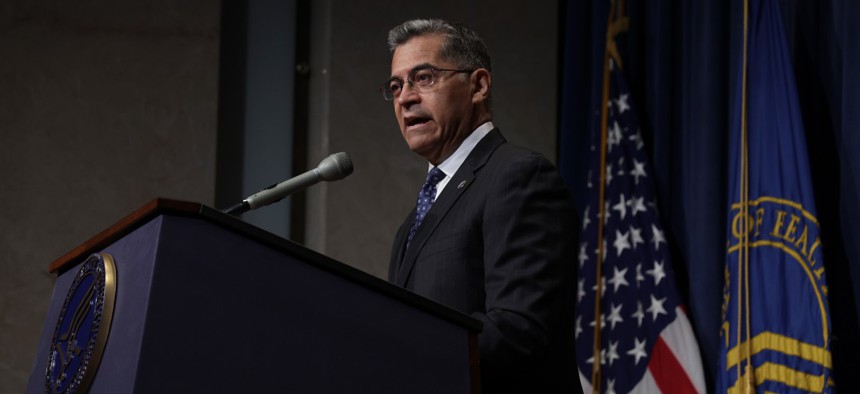
HHS Secretary Xavier Becerra speaks during a news conference on June 28. Becerra said HHS is continuing to monitor the response to monkeypox across the country. Alex Wong/Getty Images
There’s No Decision Yet on Whether to Declare a Public Health Emergency for Monkeypox
In the meantime, the Biden administration is working to make more vaccines available as the case numbers rise.
The Biden administration has not made a decision on declaring monkeypox a public health emergency, amid mounting pressure for such a designation, including from the president’s own political party.
The World Health Organization declared the monkeypox outbreak a global health emergency over the weekend. As of July 27, there have been over 20,000 cases detected globally in 77 countries and in the United States there have been over 4,600 reported cases across 48 jurisdictions. Federal public health officials have been saying recently that they expect the case count to continue to increase before it declines.
“We continue to monitor the response throughout the country on monkeypox,” said Xavier Becerra, secretary of Health and Human Services, on a briefing call Thursday, during which he touted the administration’s progress on vaccines, tests and therapeutics. “And we weigh any decision on declaring a public health emergency based on the response we’re seeing throughout the country. Bottom line is we need to stay ahead of this and be able to end this outbreak.”
In an interview with CNN earlier this week Becerra said, “We declare public health emergencies based on the data and the science, not on our worries.” As was the case with COVID-19, “our scientists are making decisions as we speak.”
Politico reported on Wednesday evening that HHS is expected to declare monkeypox a public health emergency within the coming days.
Twenty-two House Democrats backed a resolution this week advocating for HHS to declare the monkeypox outbreak a public health emergency. Last week, 50 House Democrats sent a letter to the president, endorsed by the advocacy organizations PrEP4All, Human Rights Campaign, Equality California, Silver State Equality, GLMA: Health Professionals Advancing LGBTQ Equality, and Whitman-Walker Health, saying the administration should declare the public health emergency as it would “make available a number of authorities to accelerate the federal response and tap into additional resources to procure vaccines and distribute them swiftly across the country.”
Dr. Eric Feigl-Ding, an epidemiologist and health economist who is the co-founder of the World Health Network, tweeted on Thursday “the monkeypox situation is spiraling out of control.” The White House “needs to hurry up its public health emergency declaration.”
Vaccination Update
As for vaccinations, as of July 27, HHS has distributed more than 338,000 doses of the JYNNEOS vaccines and they are making an additional 786,000 doses available starting on Friday, said Dawn O’Connell, who leads HHS’s newly reclassified Administration for Strategic Preparedness and Response. Those new doses were produced at a facility in Denmark and the Biden administration’s process to inspect and approve them saw much scrutiny.
O’Connell said the government’s allocation formula will be made publicly available soon. Also, “when including doses already distributed, the federal government will have secured more than 6.9 million monkeypox vaccine doses by mid-2023.”
The Centers for Disease Control and Prevention has been working closely with HHS and the Administration for Strategic Preparedness and Response on updating the federal vaccine allocation strategy.
With the newly announced additional doses “we have again updated the plan for allocated doses to take into account two key factors. The total population of people at risk in the jurisdiction and the number of new cases in each jurisdiction since the last allocation,” said Capt. Jennifer McQuiston, deputy director for the CDC’s division of high consequence pathogens and pathology.
“This update gives greater weight to prioritize the vaccine in areas with the greatest number of people at risk, which is men who have sex with men who have HIV or who are eligible for HIV prep, while still considering where we are seeing cases increase,” she said. CDC will also ensure “that jurisdictions have the doses they need to complete the second dose of the two dose vaccine regime for those who have already been vaccinated over the last month,” she said.
Additionally, the CDC is poised to make monkeypox a “nationally notifiable condition,” which would fill in some, but not all of the gaps in their data collection on monkeypox, Politico first reported.
“The new monkeypox surveillance case definition, which goes into effect on August 1, 2022, updates the criteria for clinical and laboratory reporting to public health and for jurisdiction data sharing with CDC during the response,” CDC spokesperson Kristen Nordlund told Government Executive on Thursday. “It also establishes the criteria that will be used for continued routine public health monitoring and action after the current response is over.”
A New Funding Proposal
Senate Appropriations Committee Chairman Patrick Leahy, D-Vt.; Senate Health, Education, Labor and Pensions Committee Chairwoman Patty Murray, D-Wash.; and Sen. Chris Coons, D-Del., chairman of the Appropriations Subcommittee on State, Foreign Operations and Related Programs, on Thursday released a new $21 billion emergency supplemental funding bill for the next phase of the COVID-19 pandemic and “other emerging diseases that pose a significant threat to public health,” which could include monkeypox.
When asked on the briefing call if HHS expects this funding to go to monkeypox, Becerra said: “We have communicated to Congress what we believe would be a good path forward on monkeypox, what it would take in terms of resources and authorities.” Also, officials “have shared with Congress as well what it takes to continue the fight on covid and hope that Congress will act on both.” The secretary vowed his department will continue to provide any assistance or information sought by lawmakers.







